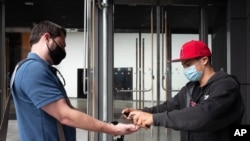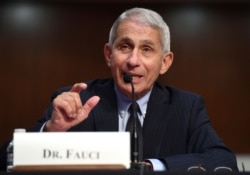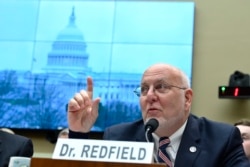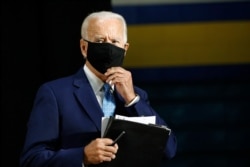The top U.S. infectious disease expert told lawmakers Tuesday on Capitol Hill he is "quite concerned" about surges of coronavirus cases in America and expressed guarded optimism that a vaccine may be available in the foreseeable future.
"There's no guarantee … that we will have a safe and effective vaccine. But we are cautiously optimistic … that we will at least know the extent of the efficacy sometime during the winter and the early part of next year," National Institute for Allergy and Infectious Diseases director Dr. Anthony Fauci said before the Senate Health, Education, Labor and Pensions committee.
Fauci warned the pandemic is not in "total control."
"We are now having 40,000 new cases a day. I would not be surprised if we go up to 100,000 a day if this does not turn around, and so I am very concerned," he said.
The committee held a hearing, titled "COVID-19: Update on Progress Toward Safely Getting Back to Work and Back to School," as at least 30 of the 50 U.S. states are experiencing spikes in the spread of the coronavirus.
As schools prepare to reopen in August and September, Fauci said a vaccine probably won't be available by then.
"Working with the companies and the investments made by this Congress, hopefully there will be doses available by the beginning of next year," Fauci said.
Committee chairman Republican Senator Lamar Alexander stressed the importance of reopening schools and called on President Donald Trump and the public at-large to wear masks to help prevent further increases in the spread of COVID-19.
"Unfortunately, this simple lifesaving practice has become part of a political debate that says if you're for Trump, you don't wear a mask. If you're against Trump, you do," Alexander said in opening remarks. "That is why I have suggested the president should occasionally wear a mask even though there are not many occasions when it is necessary for him to do so."
Alexander added that Trump "has millions of admirers" who "would follow his lead."
Fauci said, "We recommend masks for everyone on the outside. Anyone who comes in contact in a crowded area, you should avoid crowds whenever possible and when you're outside and not have the capability of maintaining distance, you should wear a mask at all times."
Fauci said states seeing surges in coronavirus cases "need to follow the guidelines that have been very carefully laid out with regard to checkpoints" to reopen. He also said some of those states began reopening "too quickly and skipping over some of the checkpoints."
Other testimony
Also testifying before the committee were Centers of Disease Control and Prevention director Robert Redfield, Food and Drug Administration commissioner Stephen Hahn and assistant secretary for health for Health and Human Services Brett Giroir.
The four health officials also testified about the coronavirus last week before the House Energy and Commerce Committee, when Redfield said a second wave of the coronavirus could erupt during the flu season in the coming months.
Redfield said Tuesday "while data is the backbone of this response, containing the outbreak depends on four core interventions: readily available testing, comprehensive contact tracing, timely isolation of known cases and quarantine to break the transmission."
"We are not defenseless against this disease," Redfield said.
Surges in US
More than 125,000 COVID-19 deaths — about one-quarter of all fatalities worldwide — have been reported in the U.S., although many experts believe the U.S. death toll is much higher.
Many of the first U.S. states to reopen, mostly southern and western states, are experiencing sharp increases in coronavirus cases.
The new surges in the U.S. have triggered renewed criticism of Trump's handling of the crisis just months before the November presidential election.
Democratic presidential candidate Joe Biden strongly criticized what he called Trump's "historic mismanagement" of the pandemic, during remarks Tuesday in Delaware.
In addition to leading the world in COVID-19 fatalities, the U.S. also is the world leader in infections, with more than 2.6 million of the world's over 10.3 million cases, according to Johns Hopkins University statistics.









